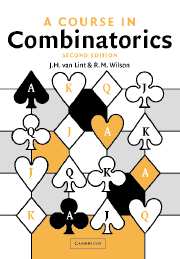Book contents
- Frontmatter
- Contents
- Preface to the first edition
- Preface to the second edition
- 1 Graphs
- 2 Trees
- 3 Colorings of graphs and Ramsey's theorem
- 4 Turán's theorem and extremal graphs
- 5 Systems of distinct representatives
- 6 Dilworth's theorem and extremal set theory
- 7 Flows in networks
- 8 De Bruijn sequences
- 9 Two (0, 1, ⋆) problems: addressing for graphs and a hash-coding scheme
- 10 The principle of inclusion and exclusion; inversion formulae
- 11 Permanents
- 12 The Van der Waerden conjecture
- 13 Elementary counting; Stirling numbers
- 14 Recursions and generating functions
- 15 Partitions
- 16 (0, 1)-Matrices
- 17 Latin squares
- 18 Hadamard matrices, Reed–Muller codes
- 19 Designs
- 20 Codes and designs
- 21 Strongly regular graphs and partial geometries
- 22 Orthogonal Latin squares
- 23 Projective and combinatorial geometries
- 24 Gaussian numbers and q-analogues
- 25 Lattices and Möbius inversion
- 26 Combinatorial designs and projective geometries
- 27 Difference sets and automorphisms
- 28 Difference sets and the group ring
- 29 Codes and symmetric designs
- 30 Association schemes
- 31 (More) algebraic techniques in graph theory
- 32 Graph connectivity
- 33 Planarity and coloring
- 34 Whitney Duality
- 35 Embeddings of graphs on surfaces
- 36 Electrical networks and squared squares
- 37 Pólya theory of counting
- 38 Baranyai's theorem
- Appendix 1 Hints and comments on problems
- Appendix 2 Formal power series
- Name Index
- Subject Index
30 - Association schemes
Published online by Cambridge University Press: 05 June 2012
- Frontmatter
- Contents
- Preface to the first edition
- Preface to the second edition
- 1 Graphs
- 2 Trees
- 3 Colorings of graphs and Ramsey's theorem
- 4 Turán's theorem and extremal graphs
- 5 Systems of distinct representatives
- 6 Dilworth's theorem and extremal set theory
- 7 Flows in networks
- 8 De Bruijn sequences
- 9 Two (0, 1, ⋆) problems: addressing for graphs and a hash-coding scheme
- 10 The principle of inclusion and exclusion; inversion formulae
- 11 Permanents
- 12 The Van der Waerden conjecture
- 13 Elementary counting; Stirling numbers
- 14 Recursions and generating functions
- 15 Partitions
- 16 (0, 1)-Matrices
- 17 Latin squares
- 18 Hadamard matrices, Reed–Muller codes
- 19 Designs
- 20 Codes and designs
- 21 Strongly regular graphs and partial geometries
- 22 Orthogonal Latin squares
- 23 Projective and combinatorial geometries
- 24 Gaussian numbers and q-analogues
- 25 Lattices and Möbius inversion
- 26 Combinatorial designs and projective geometries
- 27 Difference sets and automorphisms
- 28 Difference sets and the group ring
- 29 Codes and symmetric designs
- 30 Association schemes
- 31 (More) algebraic techniques in graph theory
- 32 Graph connectivity
- 33 Planarity and coloring
- 34 Whitney Duality
- 35 Embeddings of graphs on surfaces
- 36 Electrical networks and squared squares
- 37 Pólya theory of counting
- 38 Baranyai's theorem
- Appendix 1 Hints and comments on problems
- Appendix 2 Formal power series
- Name Index
- Subject Index
Summary
Given two k-subsets A, B of an n-set, n ≥ 2k, there are k + 1 possible relations between them: they may be equal, they may intersect in k − 1 elements, they may intersect in k − 2 elements,…, or they may be disjoint.
Given two words (k-tuples) a, b ∈ Ak, where A is an ‘alphabet’ of size at least 2, there are k + 1 possible relations between them: they may be equal, they may agree in k − 1 coordinates, they may agree in k − 2 coordinates,…, or they may disagree in all coordinates.
These instances of a set together with a list of mutually exclusive and exhaustive binary relations are examples of association schemes, which we define shortly. Association schemes provide one of the foundations of combinatorics and so we include this chapter even though it will be difficult reading. They have been implicit in many of the previous chapters; we have explicitly discussed 2-class association schemes, as they are equivalent to the strongly regular graphs discussed in Chapter 21. This chapter elaborates on some of the material of Chapter 21 but has different goals.
Association schemes arose first in the statistical theory of design of experiments, but the work of Ph. Delsarte (1973) has shown how they serve to unify many aspects of our subject. In particular, certain results of coding theory and the theory of t-designs—which were originally discovered independently—are now seen to be ‘formally dual’ aspects of the same ideas in association schemes.
Information
- Type
- Chapter
- Information
- A Course in Combinatorics , pp. 405 - 431Publisher: Cambridge University PressPrint publication year: 2001
